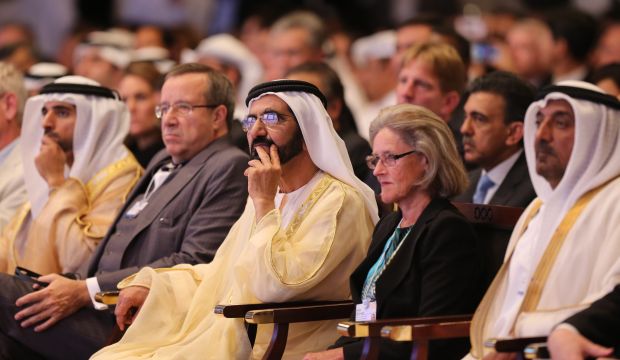No one knows in what state the Arab world and wider Middle East will be in after the region is finally able to traverse the ongoing political storm which it has endured since 2011. Despite the destruction that has been wrought and the shredding of the social fabric in Arab countries since then, this storm will surely not last forever. We will eventually witness an end to this chaos and there will be an entirely new order as a result, as happened after the First World War when the map of the region was completely redrawn.
As such, it is welcome to hear those speaking of a positive vision for the region, something which Emirati Foreign Minister Anwar Qarqash discussed recently. He spoke of a vision for the Middle East which aimed to boost development and put an end to the seemingly never-ending cycle of conflict and chaos currently engulfing the region.
The United Arab Emirates is certainly capable of achieving this vision for the Middle East. Within only four decades the country has been able to mark a place for itself as a major global economic powerhouse, international commerce and tourism hub, and important regional political player whose opinion is sought by global powers on all issues that affect the region.
During his comments, Qarqash pointed out that this vision for the region is not based on anger or discontent; instead it depends on working seriously with other regional players, like Saudi Arabia and Egypt, as a way of breaking the aforementioned cycle of conflict and chaos.
The anger and discontent which he mentioned have produced a tendency among some to bellow loud and empty slogans, so that they in a sense become like one of those large, noisy drums that are actually hollow on the inside. Other phenomena we have recently seen emerging in the Middle East include a widespread sense of despondency and powerlessness, as well as a tendency to blame others for one’s problems and an almost pathological addiction to conspiracy theories as a way of explaining events in the region (to the extent that it sometimes feels as if such people think the entire world has nothing better to do than conspire against us).
The Emirati model has succeeded because instead of concentrating on such empty sloganeering as a basis for its policies it has simply focused on the facts. The country has boosted its reliance on its domestic resources in order to carve out a place for itself as a major international hub for commerce, at the same time not being wary of opening itself up to the rest of the world or suffering from an inferiority complex or bouts of xenophobia when making ample use of foreign expertise.
Some will say the key to this success was the wealth created by oil. While oil revenues certainly did help the UAE fund projects which helped build the country—and finish them in record time—this was not however the decisive factor in the Emirati success story. After all, we have examples of other oil-producing nations that failed to achieve any real development, wasting their revenues on wayward foreign forays fueled by the narcissism and personality cults of their grandiose leaders. One obvious example is, of course, Libya, a country with oil resources matching those of the UAE; and yet here it is drowning in chaos and murder after Muammar Gaddafi wasted this wealth on a series of foreign adventures and countless arms contracts.
What the Arab world really needs right now is a vision that embeds moderation and confidence—in ourselves and the future—firmly within people’s psyches. Only such a vision will be able to defeat the “culture of suicide” which terrorist and extremist organizations promote and fill young people’s minds with so that they effectively end up becoming ticking time-bombs that walk on two legs.
Any nation which adopts a vision that relies on such sobriety in temperament, economic cooperation for the sake of development, and respect for the sovereignty of other countries’ will be able to avoid futile political adventures, instead promoting the overlapping of interests between itself and others. This ends up making the cost of any potential conflict very high and, as a result, something best avoided by everyone.
Only economic success will be able to provide the region’s millions of young people with jobs, thereby also removing the dark-tinted spectacles through which they see the world and the future—and creating optimism regarding our being able to actually build a better future. The UAE, with its solid economic experience and excellent commercial relationships with other countries, is fully capable of transferring this successful model to other Arab countries in the region who are ready and willing to apply it.
Following the Arab Spring, the Muslim Brotherhood had a general slogan which they used in order to influence the street to adopt the group’s own ideology: “You’ve already tried Arab nationalism, then neoliberal capitalism, and you have not achieved a thing,” the Brotherhood was saying. To this, I think it is best to reply by saying, “Well, why not try economic cooperation and success?” In the end, one of the main reasons for the current failure in the Arab world was the Brotherhood itself, which sought a toxic mix of religion and politics, an ideology that in the end bred much extremism.
